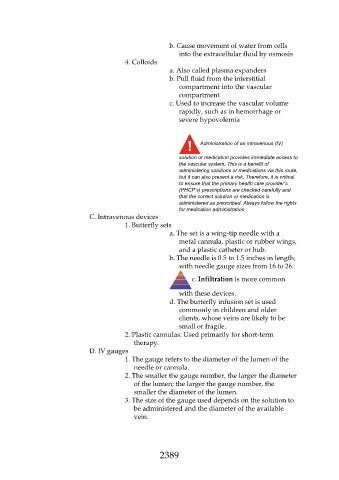Page 2389 - Saunders Comprehensive Review For NCLEX-RN
P. 2389
b. Cause movement of water from cells
into the extracellular fluid by osmosis
4. Colloids
a. Also called plasma expanders
b. Pull fluid from the interstitial
compartment into the vascular
compartment
c. Used to increase the vascular volume
rapidly, such as in hemorrhage or
severe hypovolemia
Administration of an intravenous (IV)
solution or medication provides immediate access to
the vascular system. This is a benefit of
administering solutions or medications via this route,
but it can also present a risk. Therefore, it is critical
to ensure that the primary health care provider’s
(PHCP’s) prescriptions are checked carefully and
that the correct solution or medication is
administered as prescribed. Always follow the rights
for medication administration.
C. Intravenous devices
1. Butterfly sets
a. The set is a wing-tip needle with a
metal cannula, plastic or rubber wings,
and a plastic catheter or hub.
b. The needle is 0.5 to 1.5 inches in length,
with needle gauge sizes from 16 to 26.
c. Infiltration is more common
with these devices.
d. The butterfly infusion set is used
commonly in children and older
clients, whose veins are likely to be
small or fragile.
2. Plastic cannulas: Used primarily for short-term
therapy.
D. IV gauges
1. The gauge refers to the diameter of the lumen of the
needle or cannula.
2. The smaller the gauge number, the larger the diameter
of the lumen; the larger the gauge number, the
smaller the diameter of the lumen.
3. The size of the gauge used depends on the solution to
be administered and the diameter of the available
vein.
2389

